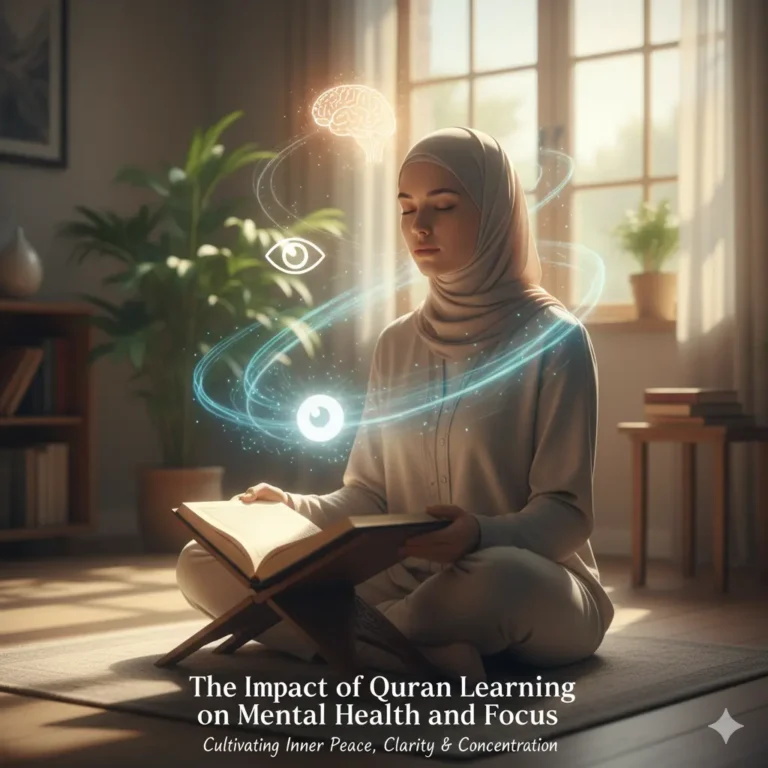In today’s fast-paced world, mental health has become a central concern for people of all ages. Stress, anxiety, and lack of focus have become daily struggles. But Islam offers a timeless remedy rooted in spirituality — the Quran. Quran learning not only connects us with Allah spiritually but also has profound psychological benefits that support emotional balance, mindfulness, and overall mental well-being.
This article explores how Quran learning strengthens mental health in Islam by uniting the principles of spirituality and psychology.
1. Spiritual Healing: The Quran as a Source of Inner Peace
The Quran is not merely a book of laws or stories; it is a divine message that brings tranquility to the heart. Allah says in the Quran:
“Verily, in the remembrance of Allah do hearts find rest.” (Surah Ar-Ra’d, 13:28)
When we engage in Quran learning, recitation, or reflection (Tadabbur), we activate the spiritual centers of peace and gratitude within us. This mindfulness practice calms the nervous system, reducing anxiety and depression — aligning deeply with psychological healing.
Courses like the Quran Recitation Course at Quran for All School help learners experience this peace daily by perfecting their connection with Allah through sound and rhythm.
2. The Psychological Benefits of Regular Quran Learning
From a psychological perspective, reciting and memorizing Quranic verses trains the brain in focus, patience, and emotional regulation. Researchers have found that spiritual practices such as Quran recitation can lower cortisol (stress hormone) levels and enhance brainwave patterns associated with relaxation.
Students who join the Quran Memorization Course or Ten Qiraat Course develop strong memory muscles, mental clarity, and emotional resilience — all of which contribute to better mental health.
3. Strengthening Focus Through Mindful Recitation
Learning the Quran requires deep concentration — whether through memorization (Hifz), Tajweed practice, or Tafsir study. Each session becomes a mindfulness exercise, training the mind to stay present and focused on the divine words.
The process mirrors modern psychological methods like mindful meditation or cognitive focus training, but with the added spiritual benefit of connecting with Allah.
Those enrolled in Quran Tajweed or Quran Ijazah Course can attest to how consistency in learning leads to stronger focus and a more centered life.
4. Quranic Reflection and Cognitive Growth
Studying the meanings and interpretations of the Quran — through courses like the Tafsir Quran Course — develops critical thinking and emotional intelligence. When learners explore Quranic verses deeply, they enhance self-awareness, empathy, and problem-solving abilities.
For instance, reflecting on stories of prophets like Yusuf (AS) and Musa (AS) teaches lessons about patience, emotional control, and resilience — values that modern psychology links to strong mental health.
Related blog: Quran Translation vs Tafsir: FAQ.
5. Emotional Stability Through the Remembrance of Allah
The Quran helps individuals regulate emotions by shifting focus from worldly worries to divine guidance. Regular recitation promotes positive emotions like gratitude and hope — essential elements of emotional stability.
Psychologically, it activates neural pathways related to optimism and peace. Spiritually, it nurtures Tawakkul (trust in Allah), helping believers manage anxiety and uncertainty with calmness.
You can explore practical memorization strategies that support emotional focus in Effective Methods for Memorizing the Quran – Tips for Students.
6. Building Resilience and Coping Skills
Mental health in Islam emphasizes resilience — the ability to recover from hardships while maintaining faith. The Quran reinforces this by teaching believers that tests are part of divine wisdom.
“Indeed, with hardship comes ease.” (Surah Ash-Sharh, 94:6)
By memorizing and reflecting on such verses, believers build emotional endurance. Quran learners tend to cope better with stress, viewing challenges through the lens of divine purpose.
The Quran Classes for Kids program introduces these values early, helping children grow with strong faith and balanced emotions.
7. Integrating Quran Learning Into Modern Mental Health Practices
Modern psychology and Islamic spirituality are not separate — they complement each other beautifully. Therapists often recommend mindfulness, gratitude journaling, and positive affirmations. Similarly, Quran learning involves reflection, remembrance, and positive self-talk through supplications.
By integrating Quran learning into daily life, one can achieve both spiritual fulfillment and psychological balance — the essence of mental health in Islam.
You can read more about this harmony in Seeking Knowledge in Islam, which highlights how learning itself is an act of worship and self-growth.
Conclusion
The Quran is more than a guide for worship — it is a holistic framework for mental wellness. It heals the soul, strengthens the mind, and trains the heart to focus on what truly matters. In Islam, mental health is not just about emotional control but about finding peace through closeness to Allah.
If you seek to experience this balance, start your journey today with one of the transformative Quran courses offered by Quran for All School — where spirituality and psychology meet for a stronger, more peaceful you.
FAQ – Quran Learning and Mental Health in Islam
1. How does learning the Quran improve mental health?
It promotes mindfulness, reduces stress, and enhances inner peace through regular remembrance of Allah.
2. Can Quran memorization help with focus and discipline?
Yes, it strengthens concentration, memory, and emotional stability through repetition and reflection.
3. What is the link between spirituality and mental well-being in Islam?
Islamic spirituality nurtures hope, gratitude, and trust in Allah — key elements of positive mental health.
4. Are Quran courses beneficial for children’s emotional development?
Absolutely. Early Quran education builds confidence, focus, and emotional resilience.
5. Where can I start learning the Quran online?
You can begin at Quran for All School, which offers specialized online courses for all ages and levels.

